THE FBA SDNY CHAPTER UNITED NATIONS REPORTER SERIES
By Rebecca La Mantia Saraceno[1]
FBA UN Reporter
November 10, 2019

During the 42nd Regular Session of the Human Rights Council, Member States discussed the use of the death penalty in order to find a balance between the two main competing positions. On one side, proponents of a Draft Resolution, Resolution L.37, urged the complete abolition of the death penalty in order to protect human rights, and, in particular the right to life. On the other side, some countries, including Egypt and Saudi Arabia, contended that the death penalty should be left to a discussion at the domestic level, so that States can better take into account the voices of the victims. The Draft Resolution contained in document L.37 was adopted with 26 votes in favor, 14 votes against, and six abstentions.
By way of background, the primary purpose of Draft Resolution L.37 is the abolition or limitation of capital punishment in every State’s legal system. The promoters call upon States to ratify the Second Optional Protocol to the International Covenant on Civil and Political Rights, which serves this objective. Furthermore, they urge all States that still apply the death penalty to limit its use to the “most serious crimes,” which involves intentional killings primarily. Another important aspect the Draft Resolution touches upon is the principle of transparency, whereby Member States that still retain the death penalty make available relevant information concerning their use of capital punishment.

The following eight countries submitted the Draft Resolution: Belgium, Benin, Costa Rica, France, Mexico, Mongolia, Moldova, and Switzerland. Benin introduced it to the Council on behalf of this cross-regional group, affirming its bridge-building role throughout negotiations. In support of the document, the Delegate of Moldova stressed the relevance of this highly-debated topic which forms a key area of discussion at the Human Rights Council’s bi-yearly debates. At this meeting, the message focused on ensuring that “States which have abolished the death penalty or have applied a moratorium are not to resume it. . . . in particular for any crimes that are not considered the most serious crimes.”

Opposition was expressed in the following manner. Egypt presented two amendments to the text and encouraged the Members of the Council to vote in their favor. First, Amendment L.39 focused on selection of a venue for the death penalty discussion. Indeed, the Delegate of Egypt argued that the Draft Resolution did not take into consideration the divergent interests of all countries and claimed that every Member State should discuss this theme in domestic debates, involving the public at large. Second, Amendment L.40 highlighted the importance of considering the interests of the victims and the need to ensure a form of reparation to their families. The Delegate of Egypt stressed the fact that “it is necessary for each State to ensure that victims dehumanized by the commission of crimes are not dehumanized by a legal decision more concerned with the rights of the offenders than with those of the victims.”

The Delegate of Saudi Arabia, presented Amendment L.41 which condemned the absence of a legal definition of “most serious crimes” and contended that the countries’ positions on the use of the death penalty reflected enormous differences. Some of them abolished capital punishment years ago, whereas others still retain it or have imposed a moratorium. According to the Delegate of Saudi Arabia, the Human Rights Council cannot address such a state-related topic through international decision-making. “Every country,” said Mr. Abdulaziz M.O. Alwasil, “has the right to choose the judicial system and legal system that seems to them best for justice to be served.”
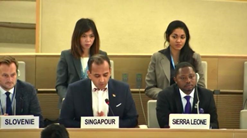
The last amendment brought before the Council was introduced by the Delegate of Singapore on behalf of a cross-regional group of 25 countries. Mr. Umej Singh Bhatia stressed that there is no consent for the use of capital punishment under international law. Absent this consent, “every country,” he said, “has the right to adopt a legal system and penalty, according to its own obligations under international law.” Moreover, he criticized the Draft Resolution’s reliance on the Human Rights Committee’s General Comment No. 36 on the right to life. That provision offers general guidance, is written by a group of 18 experts, and is not binding on States without their consent. Finally, the Delegate of Singapore claimed that “the amendment does not advocate the use of the death penalty. It takes no position on the substance of the resolution, it is an incontrovertible statement of fact and undisputed statement of law, seeking to correct some of the serious imbalances and inaccuracies of the Draft Resolution.”
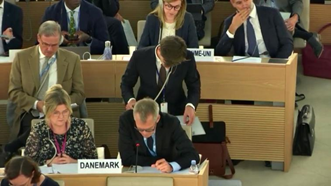
Before voting on the Amendments and the Draft Resolution, the President of the Council invited all Members to present their general comments regarding the text. Mr. Morten Jespersen, Delegate of Denmark, speaking on behalf of the European Union, affirmed that the death penalty constitutes a serious violation of human rights and human dignity. He pointed out that the abolition of capital punishment is among the EU Human Rights’ priorities and that there is no scientific evidence that the death penalty constitutes a more effective punishment than imprisonment.
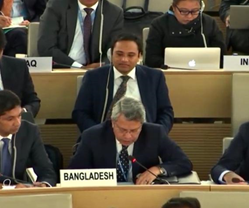
However, Mr. Shameem Ahsan, the Delegate of Bangladesh, argued that in many countries the death penalty is regarded as a tool for criminal justice policy. He said that,“society has always used punishment to discourage criminals from unlawful action.” The death penalty retains great value in the punishment of the most serious crimes, since “any lesser punishment for the most serious crimes would undermine the balance and the value that society places on protecting lives of its peoples.”
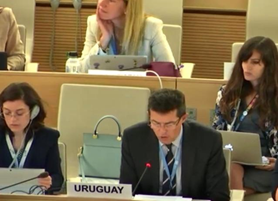
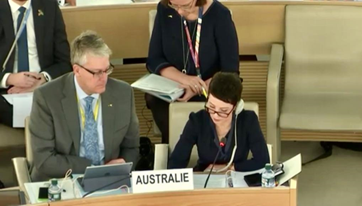
Finally, the Delegates of Uruguay and Australia, in expressing their support for the Draft Resolution, referred to two international instruments: (a) the International Covenant on Civil and Political Rights (ICCPR); and (b) the Vienna Convention on the Law of the Treaties. The Delegate of Uruguay argued that the Draft Resolution merely ratifies the Second Optional Protocol to the ICCPR — aimed at the abolition of the death penalty — to which the international community consented a few decades ago. Therefore, he argued the reinstatement of capital punishment would consist of a clear violation of international obligations already assumed by the ratifying States. The Delegate of Australia referrenced Article 27 of the 1969 Vienna Declaration which prevents States from invoking internal norms as justification for their failure to comply with an international obligation. He said that all Member States are bound by the Declaration and cannot use their legal systems’ provisions as a means to avoid their responsibilities.
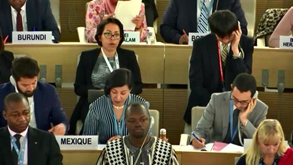
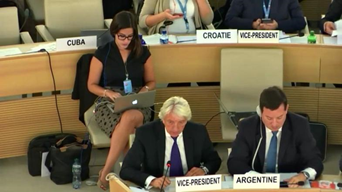
[1] Rebecca La Mantia Saraceno is an LLM Student studying International Law and Justice at Fordham Law School. She anticipates graduating in Spring, 2020.